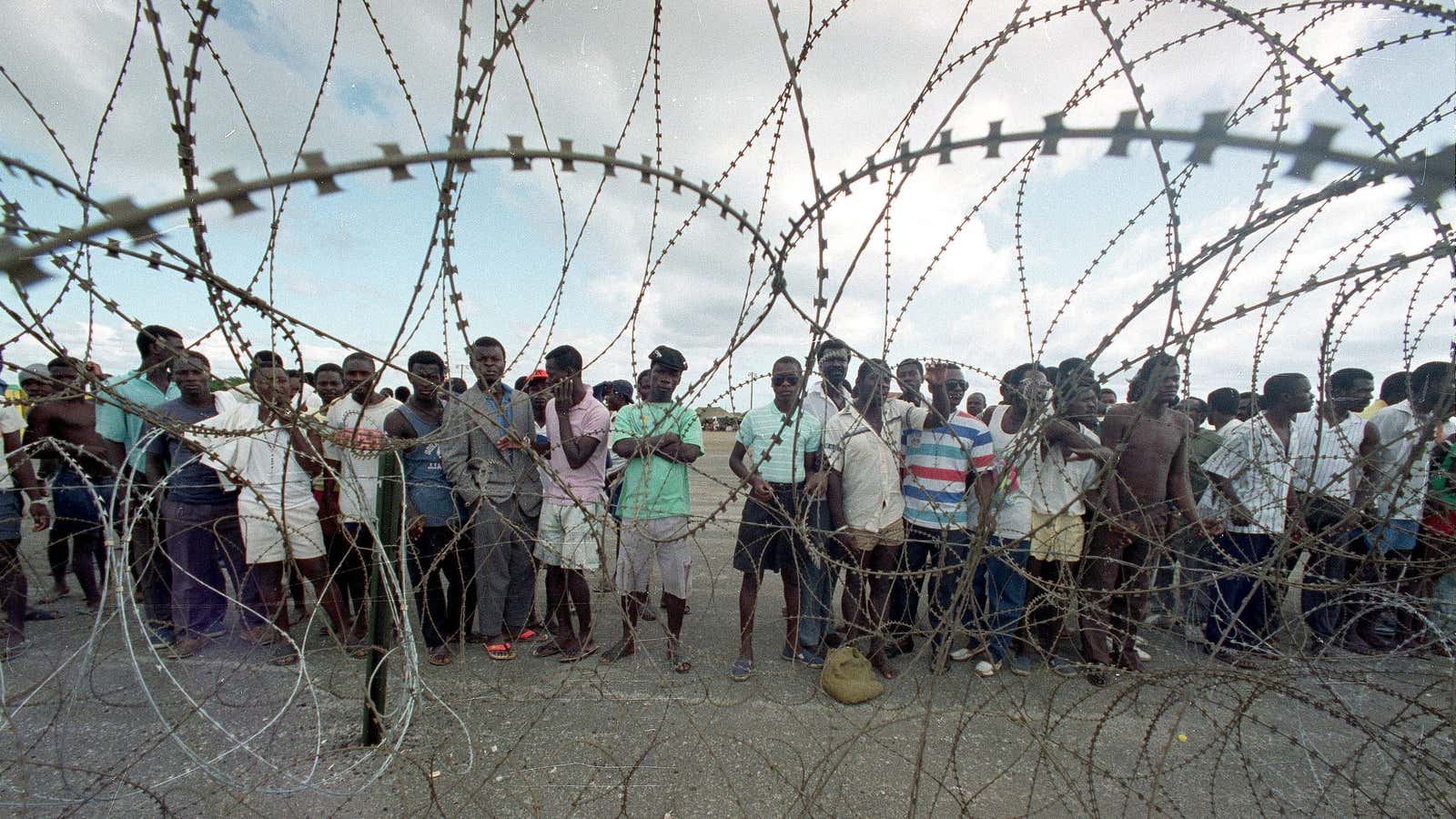Donald Trump’s pick for the top post at the Department of Justice, William Barr, has plenty of experience on immigration issues, including the detention of tens of thousands of Haitian refugees in Guantanamo Bay.
Barr, a 68-year-old corporate lawyer, served as attorney general under president George H.W. Bush from 1991 to 1993. During his tenure at the DOJ, he sought to keep Haitian refugees out of the US, and led a crackdown against immigrants already in the country.
If confirmed by the Senate, Barr would again have ample power over immigration policy. His background suggests that he has the hardline credentials favored by Trump, and shared by former attorney general Jeff Sessions, who was ousted last month.
Overseeing the INS
Back when Barr held the attorney general job, the DOJ’s authority over immigration was much broader than today. The now defunct Immigration and Naturalization Service, or INS, was part of the agency, meaning its chief was also charged with apprehending and detaining immigrants.
At the time, the US was facing an increase in the number of immigrants who were entering the US illegally in search of jobs. Shortly after taking the post, Barr launched an offensive against them. It included hiring hundreds of Border Patrol agents and INS investigators, as well as fortifying the border and expanding detention space.
He also created the National Criminal Alien Tracking Center, a predecessor to more recent efforts to get local law police and sheriffs’ departments to pitch in with the federal responsibility of finding undocumented immigrants. Crime and immigration were closely related for Barr, who devoted a significant part of the resources towards fighting “violent crime by illegal aliens.”
Haitian refugees
Barr also guided the government’s response to tens of thousands of Haitian refugees fleeing a military coup in 1991. Unlike the Central American asylum seekers now trying to enter the US by land, the Haitians travelled by boat and were intercepted by the US Coast Guard. Rather than bringing them to the mainland, the US detained them at its base in Guantanamo Bay while it processed their asylum requests, many of which were denied. The practice quickly became controversial, particularly in relation to refugees with HIV, who were isolated and kept for far longer.
A 2001 interview Barr gave to the Oral Presidential History project at the University of Virginia offers an unusually candid account of what was driving his thinking back then. He recalled arguing to keep using the base as a processing center, in conversation with then-chairman of the joint chiefs of staff Colin Powell and defense secretary Dick Cheney:
Their position was, Guantanamo is a military base, and why were all these people here, the HIV people, all these other people? How long are you going to be on our property with this unseemly business?
I’d say, “Until it’s over. But we’re not bringing these people into the United States. This is a very convenient base outside the United States, and it’s serving a good function.” They were always complaining. I would say, “What do you people do at Guantanamo? Maybe this is the highest, best use of Guantanamo. Maybe Guantanamo should be turned over to the INS and used as a processing center. Maybe this is the best use for the United States as opposed to whatever you people do with it.” We got a little bit feisty.
Although the main reason for keeping Haitian refugees off the US mainland was to enforce immigration laws, Barr also acknowledged that it was politically useful, noting that “Florida will go ape” if 80,000 Haitians suddenly arrive. “Now if you want to give me Fort something-or-other in Arkansas and let me put them there, I’ll be glad to put them on American soil,” he said during the interview, laughing, according to the transcript.
Legal counsel on immigration
As a deputy attorney general, his job before becoming DOJ chief, Barr also sought to keep HIV positive immigrants out of the US, a position over which he quarreled with other members of the administration.
The Deputy Secretary of HHS [Health and Human Services…] said, What’s your problem? I said, I’m not only in charge of immigration, but I’m a lawyer for the administration, and I have problems with this. How can you possibly say that HIV is not a disease of public health significance? Well, blah, blah, blah. He’s the top doctor, he’s the doctor of the administration, and this is his position, and that’s it. So I said, Okay, well I’m the top lawyer in the administration, and that’s it, that rule is illegal, so I’m not clearing it. Then it turned into a big fight and went public.
While the US’s immigration enforcement agency no longer sits under the Department of Justice, the attorney general can still wield considerable influence over immigration policy and enforcement. Former attorney general Jeff Sessions, for example, made it harder for immigrants to stay in the US, by toughening the legal criteria for their cases.
